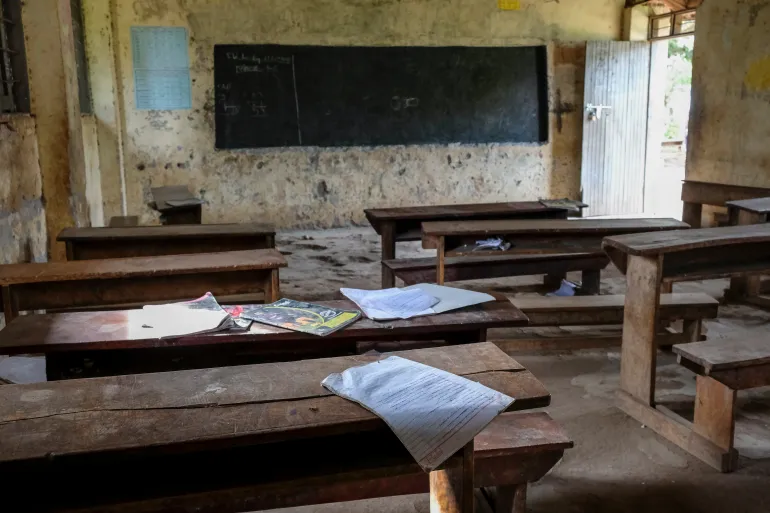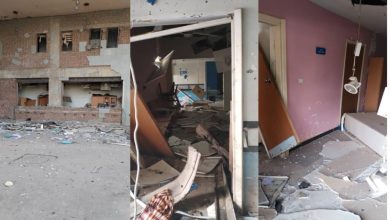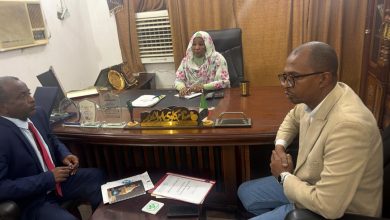War Ravages Education in Conflict Zones, Depriving Millions of Schooling
Report by: Mohamed Fadulallah

Prolonged war and ongoing instability in Sudan’s active conflict zones have deprived millions of schoolchildren and students of education, exposing them to violations, loss of family members, and even recruitment as fighters on various battlefronts.
In the five states of Darfur and the three of Kordofan, education has transformed from a basic right into a distant dream. The future of students hangs in the balance, as public and private schools and educational institutions have remained closed for over two years.
From Student to Firewood Collector
Adam Al-Sadiq, a young boy from Al-Lait locality in northern North Darfur, waited in hope for the war to end so he could return to school. But his wish never came true. As the eldest child, Adam transitioned from a primary school student to a firewood collector and seller in the local markets, where firewood is now used for cooking due to the absence of cooking gas.
“I leave early in the morning, just after sunrise, and walk four to five kilometers to a nearby valley to collect wood,” Adam told Mashawir platform. “I return by midday or sometimes in the evening. I sell the firewood the next day or later in the week. Sometimes I have to wait an entire week.”
He added, “When schools closed before the war, I was in grade seven. I only had one more year to go before sitting for the intermediate certificate exam. That one year has now become two, and I don’t know when or if I’ll be able to sit for exams again.”
“Education here stopped due to the war. Most teachers fled to other cities, while some left the country for neighboring nations like Chad and Libya,” he said. “I now support my family through this simple work. But if I ever get the chance, I will return to school. I have big dreams, and I’m determined to pursue them.”
Forced to Bear Arms
Nail Hamdan, who lives in Sunut, West Kordofan, went from holding a pen to carrying a weapon. He ended up fighting against members of his own extended family in one of the armed groups. Despite being the only one of his siblings who received attention from his father regarding education, Nail followed the same path as his four brothers—into war.
Speaking to Mashawir, Nail said, “When the war broke out, everything stopped. I had no choice but to join the fighting. I didn’t want to, but there were no alternatives. I had to go to the battlefield. Thankfully, my mother intervened. She argued with my father, who eventually allowed me to quit and return home. I’ve now taken up a different task—herding livestock.”
“I still have a strong desire to learn,” he added. “I want to raise awareness in this region through education. If I ever get a chance to leave the state, I will go—not to war, but to a place of learning.”
Devastating Impact
Education specialist Babiker Al-Tayeb told Mashawir that “schools in conflict areas have been closed for over two years, severely affecting students. Many have lost more than half of their schooling due to ongoing conflict. They now live with grim outlooks and suffer greatly from psychological distress.”
“Students in the lower grades, particularly first and second graders, have been the hardest hit. If this issue isn’t urgently addressed—and it’s clear that those in charge at every level, from the federal ministry down to school administrations, have no plan—these children are headed for failure. These early years are supposed to form the foundation for the entire educational process,” he said.
Al-Tayeb explained that escalating violence in West and South Kordofan has displaced hundreds of thousands of civilians, making it extremely difficult for students to resume their education or join schools in the areas where they now live, especially for those residing in remote displacement shelters far from urban centers.
Teachers’ Committee Rejects School Reopening
Meanwhile, the Sudanese Teachers’ Committee rejected a government decision to reopen schools, calling it a disregard for the dire security, health, and economic conditions, and a direct threat to the lives of education workers and their families.
Spokesperson Sami Al-Baqir said, “The decision to reopen schools, even partially, ignores basic standards of job security and professional safety. Many schools were severely damaged by the war—some even became makeshift burial grounds. Yet, the authorities have not inspected the buildings, removed human remains, or disinfected the premises.”
The committee also warned about the fragile health situation and the ongoing spread of epidemics like cholera. With no official statements from the Ministry of Health regarding containment, the decision endangers both teachers and students.
Al-Baqir pointed out that essential services such as water, electricity, transportation, and food are nearly nonexistent, making it virtually impossible for teachers to return to their posts. He also noted the widespread insecurity and proliferation of weapons, alongside the lack of meaningful government intervention to improve the situation.
UN Warnings
According to UNICEF, more than 90% of school-aged children in Sudan—around 19 million—have been affected by the war. Of these, 17 million are currently out of school, including 7 million who were already excluded from the educational system before the conflict.
UNICEF describes the situation as one of the worst education crises in the world, citing severe disruption to the entire learning process.
The organization reported that the ongoing war has displaced 3.5 million children, many of whom are now homeless or have lost their families. The conflict has created one of the largest child crises globally, placing approximately 24 million Sudanese children at ongoing risk due to a catastrophic humanitarian emergency of epic proportions.




